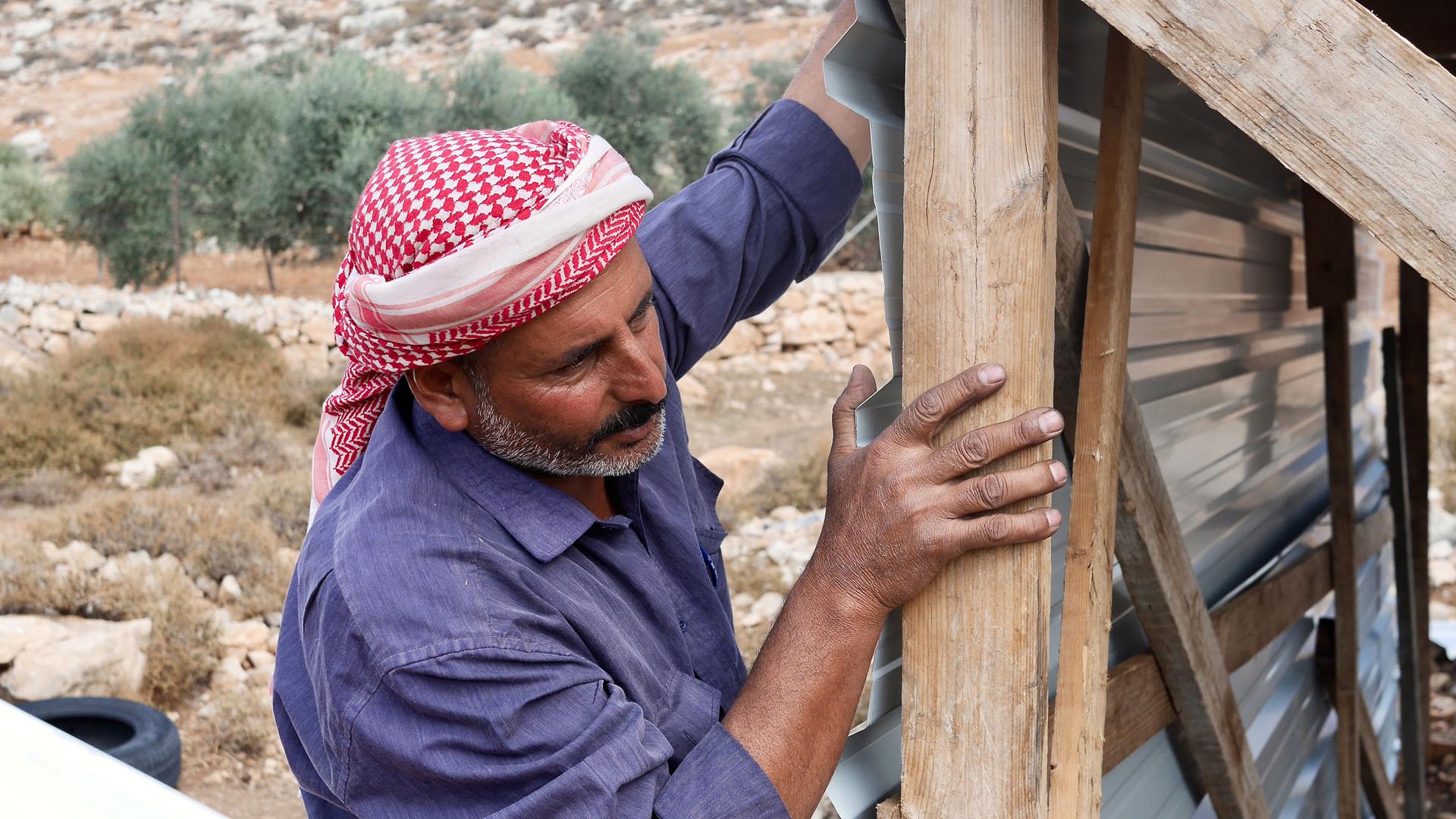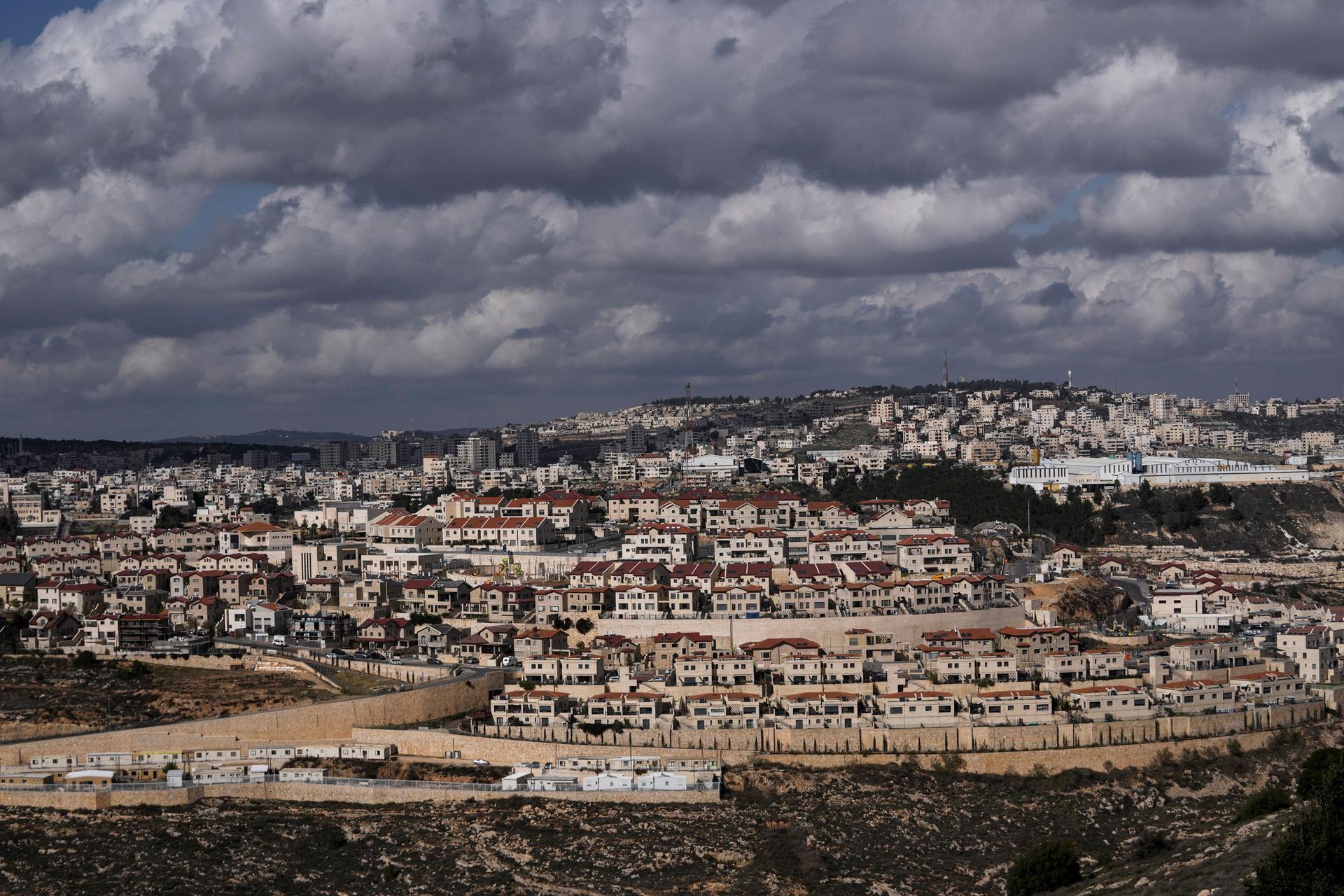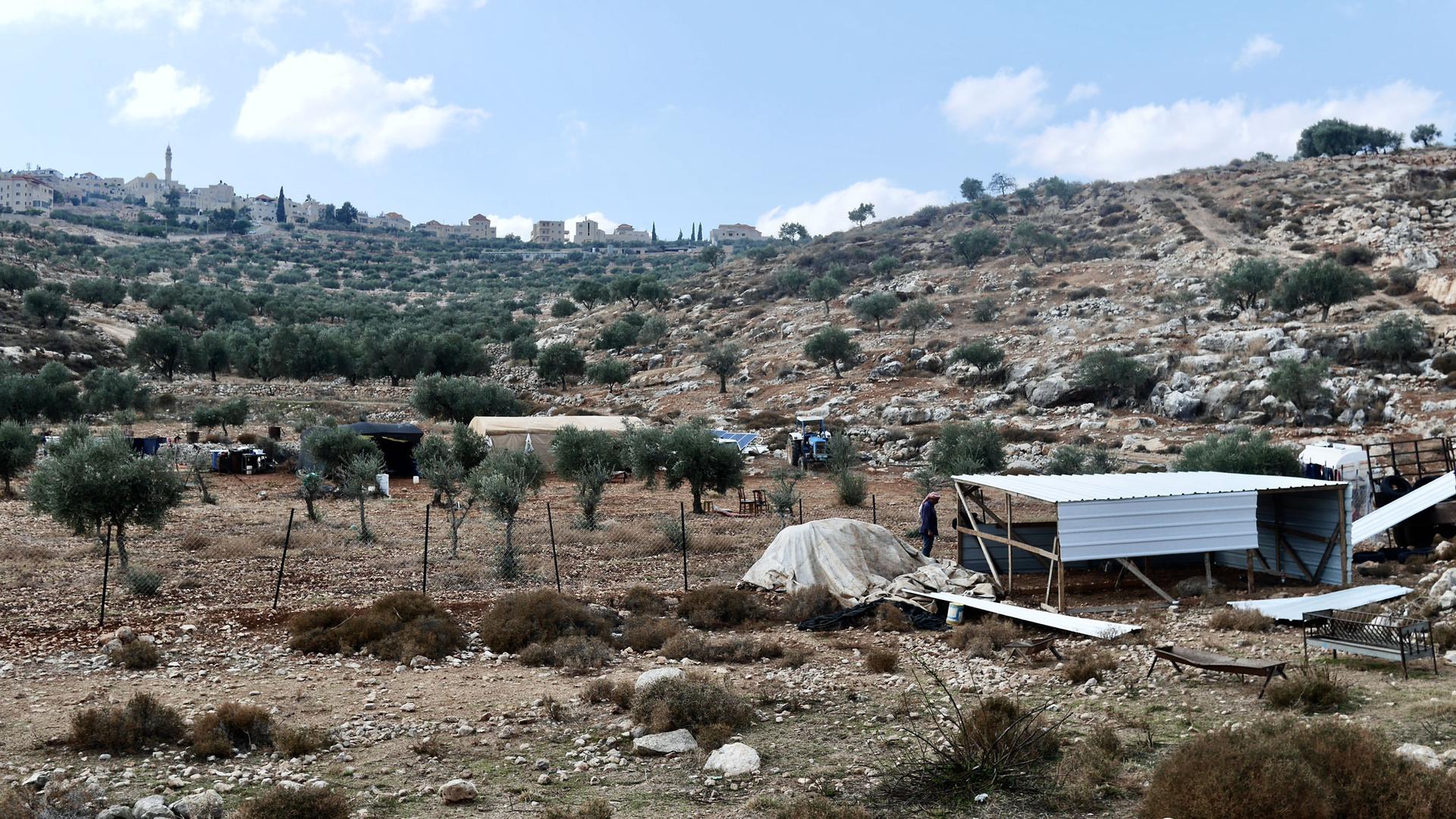In a rocky valley outside of the Palestinian town of Taybeh, Abdullrahman Mustapha Suleiman Qa’abneh, who goes by the name Abu Bashar, is rushing to prepare for the winter rains.
He is building a shelter for his sheep, nailing big sheets of corrugated tin onto a wooden frame.
Abu Bashar relocated here with his wife and their seven children on Oct. 12, just five days after the deadly attacks by Hamas militants in southern Israel.
This has been a violent year in the Palestinian territory, with a string of shooting attacks on Jews by Palestinian militants. And for months, near-daily Israeli military raids into towns and villages.
But after Oct. 7, when the Israel-Hamas war began, tensions in the West Bank got worse.
“I was kicked out of my village of Wadi al-Seeq, by weapons and excessive force, by the settlers,” Abu Bashar said through an interpreter, referring to Jewish Israelis who live in the area.

The town of Wadi al-Seeq is about 10 miles east of Ramallah, the political center of the Palestinian West Bank. Abu Bashar says his family moved there in 1985, after the Israeli army forced them to relocate from another part of the West Bank. He was about 10 years old at the time.
For most of the next 35 years, Abu Bashar said he made a living raising sheep and goats, planting olive trees, and the family got along with their neighbors in the Jewish settlements in the area.
But he said things started to change in recent years.
Israeli settlers started using new tactics, deploying illegal outposts with farming settlements throughout the area.
“They will come and they will bother us,” Abu Bashar said. “They will attack us. And this is the new technique that Israelis start to use as a threat and as pressure on us to leave,” he added.
After Israel’s new far-right government took power about a year ago, Abu Bashar said the settlers built a road close by and would speed past at all hours. They took over water wells and started grazing their sheep in the area.
“They would threaten us, harass us and scare our kids,” he said. “When we called the Israeli army, they would detain people from our village instead of stopping the harassment by the settlers.”
After the Hamas attack of Oct. 7, the situation escalated again.
Abu Bashar said settlers came with guns and cars with no license plates. They wore uniforms, but it wasn’t clear if they were active-duty Israeli soldiers. He said the men blocked the roads, tried to steal sheep, attacked the villagers and eventually threatened to kill anyone who didn’t leave.
On Oct. 12, unidentified men — it remains unclear whether they were settlers or soldiers — detained several Palestinian men who, according to local news reports, were tied up, beaten and otherwise humiliated while being held for hours.
An Israeli peace activist named Haggai was there that day as an observer trying to protect the Palestinians. He asked not to use his full name because he fears reprisals for speaking to the news media.
Haggai said he watched the scene from afar as settlers went on a rampage in Wadi al-Seeq.
“There were like 20 people and they just [got out of] the cars and chased after the Palestinians, and went inside the houses, and I don’t know what they did there exactly, but everyone they found and managed to get their hands on, they just put on the floor. I saw them kicking them and pointing the gun at them,” he said.
Haggai said he called the authorities, and when Israeli soldiers showed up, they detained him, along with other activists. The soldiers deleted pictures and videos from their phones and questioned them for several hours, asking if they were supporters of Hamas.
Haggai said it’s clear to him that West Bank settlers, with the help of the army, are taking advantage of the war in Gaza.
“[It’s] just another opportunity that the settlers and the state use, to use the war to make more Palestinians leave their land,” he added.
Abu Bashar’s family is among a group of about 200 Palestinians who have left Wadi al-Seeq. Jewish peace activists sent The World pictures of the homes of these Palestinians, which are now vandalized or demolished.
Israeli settlers who live in the West Bank and spoke to The World for this story say they don’t agree ith these types of tactics, but they also tend to think it is not a particularly big problem.
On a recent morning, Naomi Komar, 29, stopped to do some shopping in Gush Etzion, a large block of West Bank settlements, about 20 minutes by car from Jerusalem.
The mom of one with a baby on the way was buying household items. Her husband serves in the Israeli military.
Komar said Israelis are, of course, worried about the war and about the troops fighting in Gaza. But she said that in one important way, life here in the settlements is good.
“Security-wise, I don’t feel danger, like less than other times. I feel much [safer] now because there’s more security here,” she said, with more soldiers patrolling the area.
“And also, in the small settlements, we protect ourselves much better now. So people are much, much more aware and like, you feel safer,” she explained.
The settlement where Komar lives is an outpost considered illegal under Israeli law. When asked about the extremist settlers displacing Palestinians like the people in Wadi al-Seeq, she said people should not be taking the law into their own hands. But she added that Palestinians should remember who is ultimately in charge of the West Bank.
“It’s our land, and they need to recognize that, if they don’t,” she said. “I think all of Israel is Israeli land. I’m not saying Palestinians can’t live here or Arabs can’t live inside the state, but it needs to be with every condition that it’s our land and it’s an Israeli state and it’s not a Palestinian state,” she said.
Other settlers who spoke to The World echo this sentiment.
Youseef Haron is an American-born Israeli who lives in a settlement called Efrat. Instead of Palestinians displaced from the West Bank homes, Haron said that people around the world need to focus on the atrocities committed by Hamas on Oct. 7. He also said he does not support taking revenge on West Bank Palestinians for what happened that day.
“I’m not condoning going out and being a one-off revenge. That’s not what I’m saying. But if you’re threatened? It says in the Bible that if somebody comes to kill you, you kill him first. It’s a commandment in the Bible,” he said.

Palestinian officials say Israeli settlers have killed at least nine West Bank Palestinians since Oct. 7, and destroyed several thousand olive trees.
The United Nations says at least 900 people, like the herders from Wadi al-Seeq, have been forced to leave their homes.
United States President Joe Biden has called for an end to the violence in the West Bank.
“I continue to be alarmed about extremist settlers attacking Palestinians in the West Bank,” he said in late October. “They’re attacking Palestinians in places that they’re entitled to be. It has to stop. It has to be held accountable. And it has to stop now.”
Lt. Col. Jonathan Conricus, an international spokesman with the Israel Defense Forces, said the army is paying attention to the West Bank, which the Israeli government refers to by the biblical names of Judea and Samaria.
“We hear the president loud and clear and we’re taking action accordingly,” Conricus said, “to make sure that the conduct of Israeli civilians and soldiers — but Israeli civilians specifically in Judea and Samaria — is according to law and that anything that deviates from that is taken care of swiftly, clearly by the relevant authorities.”
The Israeli military reportedly fired one of the commanders involved in the incident on Oct. 12 in Wadi al-Seeq.
But for Abu Bashar and his extended family, still evicted from their homes, the future is very uncertain.
“The future is walking into a dark tunnel. I have no idea what to face tomorrow,” Abu Bashar said.
The family is currently staying on someone’s private land temporarily, but they’re going to need to find somewhere else to live in a few months.
At this point, they’re not sure about their options.
Fuad AbuGosh and Yonit Farago contributed to this report.
The World is an independent newsroom. We’re not funded by billionaires; instead, we rely on readers and listeners like you. As a listener, you’re a crucial part of our team and our global community. Your support is vital to running our nonprofit newsroom, and we can’t do this work without you. Will you support The World with a gift today? Donations made between now and Dec. 31 will be matched 1:1. Thanks for investing in our work!
